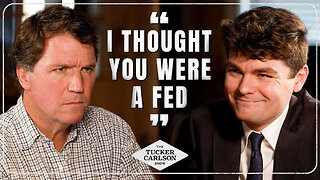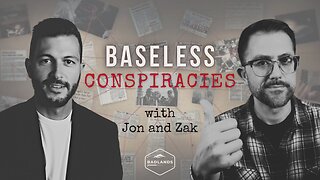Premium Only Content

Episode 2896: The Madness of King Nebuchadnezzar and Modern Leaders with Sharon
The Madness of King Nebuchadnezzar and Modern Leaders
Well welcome back to Catholic Reboot and as you hear me say many times “There is nothing new under the sun, we just think we are so unique” of course the first part I lift from the words from King Solomon.
Well, as we were doing the book of Daniel we spoke about the madness of King Nebuchadnezzar eating grass with the cows and that got me thinking do our modern leaders suffer that same and are they just mad or evil?
But before we get started let me start with a prayer.
Welcome to today’s episode, where we delve into an ancient Biblical story with striking modern relevance. We’ll be discussing King Nebuchadnezzar, the great Babylonian ruler who succumbed to madness due to his pride and failure to acknowledge God. With us is Walt, who will help us draw some compelling parallels to the behaviors and spiritual pitfalls of our modern political leaders.
________________________________________
Sharon: Introductory Prayer:
“Almighty and eternal God, we beseech Thee to grant wisdom and humility to those in authority. May they recognize that all power and dominion come from You, the King of kings. Through the intercession of St. Thomas More, the patron saint of statesmen, guide their hearts to seek truth and justice, always in accordance with Your will. Amen.”
________________________________________
Introduction
Sharon:
Our episode scripture theme is: "The Most High rules the kingdom of men and gives it to whom he will and sets over it the lowliest of men." - Daniel 4:17
So Walt what you say?
Walt: Thanks, Sharon. The story of King Nebuchadnezzar in the Book of Daniel is not just a historical account but a warning to all generations. It illustrates how unchecked pride, a lust for power, and the rejection of God’s authority can lead to personal and societal ruin.
________________________________________
Part 1: The Madness of Nebuchadnezzar
Sharon: Let’s begin with the story. King Nebuchadnezzar was warned in a dream interpreted by the prophet Daniel. The dream foretold that his kingdom would be taken away, and he would live like an animal until he recognized that the Most High is sovereign over all kingdoms.
Walt: That’s right, Sharon. Despite this warning, Nebuchadnezzar arrogantly took credit for Babylon’s glory, declaring, “Is not this great Babylon, which I have built by my mighty power as a royal residence and for the glory of my majesty?” (Daniel 4:30). His failure to acknowledge God led to his downfall he was driven out to live like a beast, eating grass, until he humbled himself before the Lord.
________________________________________
Part 2: Parallels to Modern Politicians
Sharon: Now let’s talk about modern politicians. Don’t we see the same kind of pride and hubris today? Many leaders operate as if their power and achievements come solely from their own ingenuity, rejecting the sovereignty of God over their nations.
Walt: Exactly. Take the way some politicians blatantly dismiss natural law and divine order, embracing policies that contradict God’s commandments. They legislate abortion, same-sex unions, and other grave sins, all while claiming to act for the ‘greater good.’ This is eerily similar to Nebuchadnezzar’s arrogance believing they are the ultimate authority and that their human wisdom surpasses divine wisdom.
Sharon: And like Nebuchadnezzar, they often experience a kind of madness. We see this in their inability to discern truth from error, their policies that lead to societal chaos, and their insistence on controlling every aspect of people’s lives. Pride blinds them to reality.
Part 3: The Consequences of Rejecting God
Walt: Nebuchadnezzar’s story also highlights the consequences of rejecting God’s authority. His madness was not just a punishment but a form of purification. It wasn’t until he lifted his eyes to heaven and acknowledged God’s sovereignty that his sanity and kingdom were restored.
Sharon: Yes, and this should be a lesson for our leaders today. Without humility and dependence on God, their efforts to build a utopia on earth will inevitably fail. History has shown us repeatedly that leaders who abandon God and exalt themselves above Him bring destruction upon their nations.
Walt: Consider the rise and fall of empires Rome, the Soviet Union, and even our own nation, which seems to be teetering on the edge of moral and spiritual collapse. The root cause is the same: a refusal to submit to the divine order and an overreliance on human pride and power.
Sharon: Not to add confusion for our listeners, but…this reminded me of King Saul, too. He was given an evil spirit for all the injustices he did to God. In 1 Samuel 13:12-14 it says: I offered the holocaust. [13] And Samuel said to Saul: Thou hast done foolishly, and hast not kept the commandments of the Lord thy God, which he commanded thee. And if thou hadst not done thus, the Lord would now have established thy kingdom over Israel for ever. [14] But thy kingdom shall not continue.
And, in 1 Samuel 18:9-10: And Saul did not look on David with a good eye from that day and forward. [10] And the day after the evil spirit from God came upon Saul.
Saul had a lack of faith, raised Samuel from the dead which was forbidden, and did not kill all the philistines when God told him to in battle, and fell on his own sword after being mortally wounded in battle which was then considered suicide.
God had put an evil spirit in him that drove him mad. David was the only one who could soothe his madness by playing music for him. But, let’s remember, it is believed that King Nebuchandnessar, a pagan king, repented and was saved. Saul, who was chosen by God to be king, a jew, took his own life at death and did not repent.
________________________________________
Part 4: A Call to Humility and Prayer
Sharon: So, what can we as faithful Catholics do? First and foremost, we must pray for our leaders. St. Paul exhorts us to offer “supplications, prayers, intercessions, and thanksgivings for all people, for kings and all who are in high positions” (1 Timothy 2:1-2).
Walt: We also need to remind our leaders of their responsibilities before God. The Church has always taught that civil authority is subject to the moral law. St. Pope Pius X famously said, “The state must recognize the Church, not as its enemy, but as its helper in securing the good of its citizens.”
Sharon: Finally, we must lead by example. Just as Nebuchadnezzar eventually humbled himself, we can show our leaders the way by living lives of humility, obedience to God, and faithfulness to His commandments.
________________________________________
Closing Thoughts
Walt: Nebuchadnezzar’s story gives us hope. It shows that even the most prideful and powerful leaders can be converted when they recognize God’s authority. But conversion often comes at a cost through suffering and purification.
Sharon: Let us pray for our leaders, that they may turn to God before facing their own “Nebuchadnezzar moment.” Let us pray and not assume that the ‘good’ leaders don’t get lost in the atmosphere in which they are working and surrounded with and fall. And let us always remember that no matter how chaotic the world may seem, God is in control. As the psalmist says, “The Lord reigns; let the earth rejoice” (Psalm 97:1)
________________________________________
Walt: Concluding Prayer:
“Heavenly Father, we ask You to bless and guide our leaders. Grant them humility to acknowledge You as the source of all authority and the wisdom to govern according to Your will. May they, like Nebuchadnezzar, come to know that Your kingdom is everlasting and Your dominion endures through all generations. We ask this through Christ our Lord. Amen.”
________________________________________
Sharon: Thank you for joining us today. If you enjoyed this episode, please share it with others and pray for the conversion of our leaders. Until next time, may God bless you and Our Lady protect you!
Walt: See you next time!
-
 2:18:46
2:18:46
Tucker Carlson
10 hours agoTucker Carlson Interviews Nick Fuentes
160K614 -
 2:06:42
2:06:42
FreshandFit
12 hours agoCharleston White Addresses The Backlash From His Charlie Kirk Comments
343K80 -
 1:34:52
1:34:52
Badlands Media
16 hours agoBaseless Conspiracies Ep. 156: The ADL Files – Spies, Lies & the Leo Frank Legacy
88.8K37 -
 2:04:29
2:04:29
Inverted World Live
11 hours ago700 Scientists and Faith Leaders Warn About Super-Intelligent AI, "Time is Running Out" | Ep. 130
87.2K13 -
 2:50:47
2:50:47
TimcastIRL
10 hours agoFOOD STAMPS OVER, Ending Nov 1, Food RIOTS May Spark Trump INSURRECTION ACT | Timcast IRL
237K148 -
 4:46:23
4:46:23
Drew Hernandez
20 hours agoCANDACE OWENS CALLS CHARLIE KIRK STAFF INTO QUESTION?
49.2K59 -
 47:03
47:03
Barry Cunningham
13 hours agoPRESIDENT TRUMP MEETS WITH THE PRIME MINISTER OF JAPAN!! AND MORE NEWS!
66.3K32 -
 1:18:29
1:18:29
Flyover Conservatives
1 day agoThe Dollar Devaluation Playbook: Gold, Bitcoin… and the “Genius Act” - Andy Schectman | FOC Show
58.9K5 -
 7:10:35
7:10:35
SpartakusLIVE
12 hours agoWZ Tonight || Battlefield 6 BATTLE ROYALE Tomorrow!
61.2K1 -
 3:25:11
3:25:11
megimu32
10 hours agoON THE SUBJECT: Halloween Nostalgia! LET’S GET SPOOKY! 👻
43.8K1